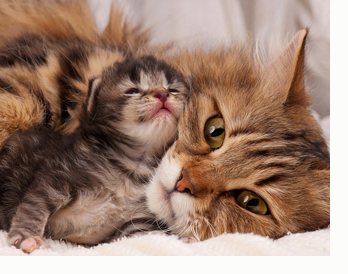Kids with Strong Bonds to Parents Make Better Friends, Can Adapt in Relationships
Urbana, IL; June 19, 2014—What social skills does a three-year-old bring to interactions with a new peer partner? If he has strong bonds to his parents, the child is likely to be a positive, responsive playmate, and he'll be able to adapt to a difficult peer by asserting his needs, according to a new University of Illinois study published in Developmental Psychology.
(Full story . . . )
Infants Are Sensitive to Pleasant Touch
April 2, 2014—Infants show unique physiological and behavioral responses to pleasant touch, which may help to cement the bonds between child and parent and promote early social and physiological development, according to research published in Psychological Science, a journal of the Association for Psychological Science.
(Full story . . . )
Four in 10 Infants Lack Strong Parental Attachments
PRINCETON, NJ; March 27,2014—In a study of 14,000 U.S. children, 40 percent lack strong emotional bonds—what psychologists call "secure attachment"—with their parents that are crucial to success later in life, according to a new report. The researchers found that these children are more likely to face educational and behavioral problems.
(Full story . . . )
“Kangaroo Care” Offers Developmental Benefits for Premature Newborns
July 10, 2013—New research in the Journal of Newborns & Infant Nursing Reviews concludes that so-called “kangaroo care” (KC), the skin-to-skin and chest-to-chest touching between baby and mother, offers developmentally appropriate therapy for hospitalized preterm infants.
(Full story . . . )
Closer Personal Relationships Could Help Teens Overcome Learning Disabilities
AFTAU, February 28, 2013 In addition to struggling in school, many learning disabled children are known to face social and emotional challenges including depression, anxiety, and isolation. Often beginning early in childhood, they become more pronounced during adolescence, an emotionally turbulent time.
(Full story . . . )
Infants in Poverty Show Different Physiological Vulnerabilities to the Caregiving Environment
February 19, 2013—Some infants raised in poverty exhibit physical traits that make them more vulnerable to poor caregiving, according to new research published in Psychological Science, a journal of the Association for Psychological Science. The combination of physiological vulnerability and poor caregiving may lead these children to show increased problem behaviors later in childhood.
(Full story . . . )
Attachment Issues: Debunking the Parenting Wars
Whatever parenting approach you choose, someone in your circle will have a strong opinion about why it is wrong. There is only one right way, our closest advisers often insist, and that way is “their” way.
Lately, however, one approach to parenting has become an especially heated battleground. Attachment parenting—usually associated with co-sleeping, baby-“wearing” and prolonged breast-feeding—is heard increasingly often these days. Yet it isn’t always well understood, even by those who support it. It appears that the media’s parenting wars are causing many people to throw out the baby with the bathwater.
Are the myriad parenting styles offered by the media as opposites to attachment parenting—French parents and Tiger Moms for instance—really that far apart in the fundamentals? And if they are poles apart, where is the evidence to support their philosophies? What is “attachment,” what does it have to do with parenting, and how does it relate to mental health and well-being?
(Full story . . . )
Born to Connect
The Role Secure Attachment Plays in Resilience to Depression, Anxiety and Trauma
On the timeline of human history, the structure of the modern nuclear family is a relatively new invention. When we refer to past norms, we often stop at “Leave It to Beaver,” as though parents always left home to spend their days in an office and Grandma’s house was never closer than over the river and through the woods.
But once upon a time in the very real world, it was not so unusual for extended families to live together in the same community—each family member contributing significantly to the wellbeing of the group. When children were old enough to help, they worked alongside their parents, and if a mother became overwhelmed with the care of an infant, there were likely to be grandparents, cousins or siblings who could step in to help.
.
This hands-on experience taught older children how to care for infants in the family, so that by the time they had children of their own they were not ignorant about child care.
(Full story . . . )
Just What Do You Mean, Attachment?
The problem with books meant to popularize psychology is that they don’t always make the research easier for people to understand. Sometimes pop-psych and self-help writers get in the way of understanding: either by oversimplifying the concepts or leaping to unjustified conclusions about how to apply it in practical life. As a result, people who can’t make the leap with the author not only reject taking the stretch, they may be so confused about where the original research begins and ends that they also reject what could have been important, life-changing insights.
Is this what attachment theory is facing? Have extreme interpretations of what is now popularly known as “attachment parenting” actually caused many people to throw out the baby with the bathwater (so to speak)? What do researchers mean when they talk about attachment?
(Full story . . . )

